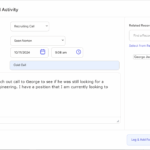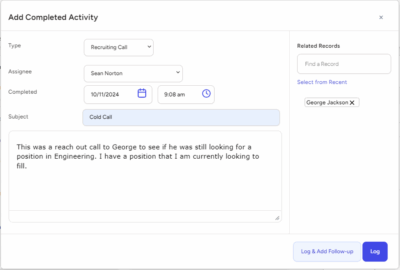(Editor’s note: The information from this article by Top Echelon Recruiting Software has been taken from an Expert Recruiter Coaching Series webinar by Rob Mosley of Next Level Training titled, “Are You Emotionally Intelligent?” Click HERE to watch the video of that training webinar for free.)
In today’s fast-paced, high-pressure world, emotional intelligence (EQ) has emerged as one of the most in-demand skills—especially in industries like recruiting, where human connection is everything. Rob Mosley, a partner at Next Level Exchange and a trusted advisor to staffing and recruiting firms, is a big proponent of emotional intelligence and why mastering it could be the single most important investment you make in yourself this year.
“This is our most in-demand session,” Mosley began. “And for a while, I couldn’t quite figure out why. But now, all you have to do is turn on the evening news to see that the world feels angst. People are under pressure—and in that tension, EQ becomes the engine that makes everything else work.”
Let’s explore what emotional intelligence really is, why it matters more than ever, and how you can improve your EQ to deepen trust, drive performance, and show up more effectively—for your clients, candidates, and yourself.
What Is Emotional Intelligence?
Emotional intelligence, sometimes referred to as EQ, is your ability to recognize, understand, and manage your own emotions—and the emotions of others. Mosley referenced a widely accepted definition: “It’s the ability to monitor your own and others’ emotions, to discriminate between different emotions and label them appropriately, and to use that emotional information to help guide thinking and behavior.”
He encouraged attendees to think about this in real-world terms. “Think about your clients, your candidates, your colleagues, your friends and family. EQ isn’t just a business tool—it’s a life tool.”
The Dog in the Minefield: A Metaphor for Emotional Awareness
To drive the importance of emotional responsibility home, Mosley shared an unforgettable image: a black-and-white photo of an American GI carrying a dog through a Korean rice field—one known to be laced with landmines.
“It’s not about whether that soldier loved dogs,” Mosley explained. “It’s about the fact that if you let any little jackass run around freely, you’re going to blow up the whole field.”
The takeaway? Sometimes, emotional maturity means carrying the load for others who can’t yet see the full picture. And sometimes, it means letting others carry the load for you. EQ starts with awareness—of the situation, of yourself, and of the people around you.
Beyond Skillset: Mindset and Trust
In recruiting, Mosley explained, your IQ—your skillset—is critical. But it’s your mindset that determines how effectively you apply it.
“Our clients and candidates are constantly making judgments,” he said. “They’re asking: Do I trust this person? Are they legitimate? Do they understand me—or are they just trying to sell me something?”
EQ builds trust. And trust, Mosley emphasized, is the cornerstone of successful relationships. “You can’t build a strong business without it,” he said. “Greater self-awareness helps you make better choices, and better choices build trust.”
Self-Awareness: The First Step to EQ
The journey toward emotional intelligence begins with self-awareness. One exercise Mosley introduced was a list of 24 human qualities—things like being assertive, competitive, analytical, empathetic, methodical, spontaneous, and more. None are inherently “good” or “bad”—they’re preferences and tendencies.
He encouraged everyone to ask themselves: “Which of these best describes me at my best? What do I bring to my team or to my relationships?” For Mosley, those traits were “demonstrative” and “competitive.”
But then he dropped a truth bomb: “Someone’s greatest strength is also often their greatest weakness.”
Under stress, a demonstrative person might become overbearing. A competitive person might become ruthless. This is the concept of overextension—when strengths, unchecked, turn into liabilities.
“The EQ moment,” Mosley said, “is asking: How do I show up under stress? How do others perceive me? And what does that mean for the trust I’m trying to build?”
Paradigms and Perception: The World as We Are
Quoting his grandmother, Mosley shared a deeply personal insight: “Nobody sees the world as it is. We see the world as we are.”
Our worldview is shaped by where we’re from, how we were raised, and what we’ve experienced. That means everyone else’s worldview is, too. You don’t have to agree with someone’s perspective—but understanding it makes you more effective.
To drive this home, Mosley shared a series of world maps from different countries—each centered around its own nation. “Just like maps, our psychological framework contains bias,” he said. “This session is about reducing bias—about seeing yourself and others with a little more grace.”
The Three Personas: Everyday, Underlying, Overextended
Mosley introduced the concept of the three selves:
-
Everyday Persona – Our LinkedIn profile. How we want to be seen.
-
Underlying Persona – Who we are with those we trust.
-
Overextended Persona – Who we become under stress.
He reminded us that self-awareness includes all three. “When the pressure’s on, when it’s Friday night and you’ve been on three delayed flights and walk into the house—how do you show up?” he asked. “That’s EQ.”
The Language of Leadership: Words Shape Relationships
According to Mosley, words matter—immensely. “Language determines the conversation. The conversation determines the relationship. The relationship determines the outcome.”
Simple word choices can make a difference. Are you seeking to “place a candidate” or “solve a business problem”? Do you “send resumes” or “introduce leaders”? Language either builds your authority—or undermines it.
Identifying Blind Spots: The Hockey Example
To demonstrate how quickly our brains jump to conclusions, Mosley shared a scenario: your hockey team wins two tickets to the Stanley Cup. How do you decide who goes?
Before the group could answer, he revealed the twist: “That’s not your hockey team. This is.” And showed a photo of a youth team.
The lesson? We fill in gaps based on assumptions. EQ requires that we slow down and ask better questions before drawing conclusions. “If people don’t tell you the story,” Mosley warned, “you’ll make it up—and that’s where problems begin.”
Cognitive Bias: The Hidden Mental Filters
Mosley walked attendees through four of the most common cognitive biases that show up in client and candidate conversations:
-
Loss Aversion – The fear of losing something is twice as powerful as the hope of gaining it.
-
Anchoring – We fixate on the first piece of information we hear, such as a salary number.
-
Status Quo Bias – We’d rather stay with the familiar—even if it’s not ideal.
-
Myopia – We prioritize short-term gratification over long-term success.
Understanding these helps recruiters anticipate resistance and respond with empathy and strategy.
“Vegas is built on loss aversion,” Mosley joked. “You’ll stay at that table until you’re broke just to win back what you lost. The same applies to job seekers, hiring managers—even ourselves.”
Building Trust: From Emotional to Economic Impact
“Trust is not just a touchy-feely thing,” Mosley declared. “It’s an economic metric.”
When trust breaks down, costs go up. Think about it: if your manager doesn’t trust you to follow through, they get involved—and now two people are doing one job. On a macro level, lack of trust created TSA.
Mosley encouraged attendees to take a “Trust and Integrity” self-assessment—then, critically, to ask someone else to fill it out about them. “You may think you’re trustworthy,” he said, “but how you’re perceived is what matters.”
Small Behaviors That Build Big Trust
To rebuild or deepen trust, Mosley offered a list of practical behaviors:
-
Do what you say you’ll do.
-
Clarify expectations.
-
Communicate directly—not just through email.
-
Be loyal to those not present.
-
Apologize sincerely.
-
Seek first to understand, then to be understood.
“If you choose to bow,” he said, referencing a Japanese proverb, “bow low.”
Prioritization and the Circle of Influence
Borrowing from Stephen Covey’s “circle of concern” versus “circle of influence,” Mosley reminded the audience to focus energy where it can actually make a difference.
“There’s a lot to be worried about,” he said. “Inflation, war, elections. But how much of that can you truly impact?”
Instead, Mosley challenged listeners to look inward. “Am I focusing on things I can control—my choices, my mindset, my actions—or am I spinning my wheels on things that are outside of my control?”
Above the Line vs. Below the Line Thinking
“Everything in life is neutral,” Mosley said. “We decide whether it’s stressful or not.”
He described two energy states:
-
Catabolic – Negative energy that drains us.
-
Anabolic – Positive energy that fuels us.
Do you live above the line—hopeful, creative, solutions-focused? Or below the line—fearful, skeptical, stuck?
“As a member of the team,” Mosley said, “we have an obligation to live above the line—for our clients, candidates, and colleagues.”
Final Challenge: 30 Days to Higher EQ
To close, Mosley issued a 30-day challenge: pick one relationship—work or personal—where trust isn’t what it should be. Identify one positive behavior to adopt and one negative habit to drop in service of rebuilding that trust.
He also reminded the audience: “Everything we talked about—cognitive bias, trust, self-awareness—it’s not a destination. It’s a journey. And the best news is, you have the power to start anytime.”
A Final Word from Rob Mosley
“You are not dealing with logic,” Mosley concluded. “You are dealing with emotion. The better you become at managing that emotion—yours and others’—the better recruiter, the better colleague, the better leader you’ll be.”
And that’s the real promise of emotional intelligence: not just success in your career, but peace, clarity, and connection in your life.









